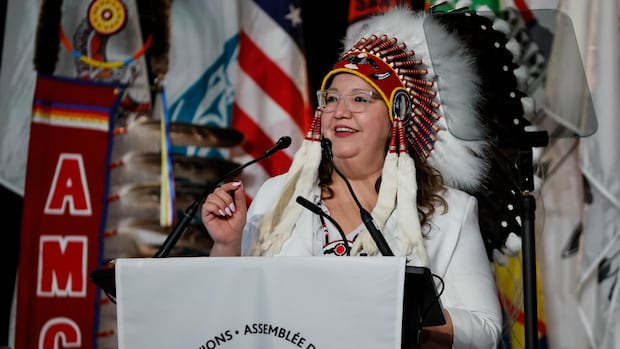First Nations leaders and representatives from various regions are convening in Winnipeg for the annual general assembly of the Assembly of First Nations (AFN) this Wednesday. The AFN, a prominent national advocacy organization representing over 600 First Nations, is hosting a three-day assembly where numerous chiefs and delegates will engage in discussions and pass resolutions on crucial topics such as health, education, the environment, human rights, and language and culture.
The current agenda for this year includes deliberations on matters concerning First Nations policing, reforms in child welfare, strategies for reducing substance use harm, and the return of artifacts. Notably, the chiefs are slated to address Bill C-5 and the issue of the First Nations infrastructure gap during the afternoon sessions on Wednesday.
Bill C-5, known as the Building Canada Act, grants the federal government the authority to expedite major economic development projects deemed nationally significant. While the government asserts that these amendments will promote economic advancement, many First Nations leaders caution that the streamlined process could potentially bypass the Crown’s obligation to consult, thus potentially infringing on Indigenous rights.
In her opening speech, AFN National Chief Cindy Woodhouse Nepinak emphasized the importance of upholding rights, laws, lands, resources, and waters in the face of historical challenges within Crown-First Nations relationships. Additionally, Assembly of Manitoba Chiefs Grand Chief Kyra Wilson echoed these sentiments, emphasizing the collective need to safeguard rights and responsibilities to the land, despite differing opinions on Bill C-5.
The federal government recently announced the establishment of a Major Projects Office to facilitate the approval processes for projects under Bill C-5. This office will feature an Indigenous advisory council, set to launch soon, as disclosed by Crown-Indigenous Relations Minister Rebecca Alty during her address to the assembly. Alty emphasized the government’s commitment to fostering resilient economies through partnerships with First Nations, stressing the necessity of meaningful consultation with affected Indigenous communities before advancing major nation-building projects.
During the “Economic Summit” session on Wednesday, Manitoba Premier Wab Kinew, who hails from the Onigaming First Nation in Ontario, emphasized the critical role of First Nations in nation-building endeavors, cautioning against proceeding with projects without ensuring Indigenous community support. Kinew highlighted the importance of early dialogue to expedite project development while respecting Indigenous perspectives.
Sen. Paul Prosper, representing the Mi’kmaw community in Nova Scotia, stressed the importance of ensuring that the Indigenous advisory council serves as more than just a checkbox for consultation. Woodhouse Nepinak urged the upcoming federal budget to address the infrastructure gap and mitigate the concerns sparked by Bill C-5, highlighting the significant investment required to bridge this gap and create economic opportunities for First Nations.
The assembly, initially planned for July, was postponed due to wildfires that prompted evacuations in Manitoba, with hotel accommodations prioritized for displaced residents. Manitoba Regional Chief Willie Moore acknowledged the impact of the wildfires and expressed solidarity with affected communities, urging attendees to keep those affected in their thoughts during the assembly sessions.



